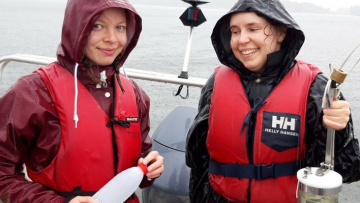Effect of salinity and temperature on copepod reproduction and oxidative stress in brackish-water

The Research Article "Combined effect of salinity and temperature on copepod reproduction and oxidative stress in brackish-water environment" has been published in Front. Mar. Sci., 17 August 2022, Sec. Marine Biology. DOI: https://doi.org/10.3389/fmars.2022.952863
Abstract
Climate-induced warming and increased river inflows are forcing the Baltic Sea to radical changes in the near future; organisms living in this brackish-water ecosystem are already experiencing osmotic stress, which, together with thermal stress, may have severe consequences on the ecosystem. The aim of this work was to study the combined effect of decreasing salinity and increasing temperature on reproductive success and oxidative stress in zooplankton by using a calanoid copepod Acartia sp. as a model organism.
The field study was conducted during summer 2020 in the western Gulf of Finland, using three sampling sites with naturally differing salinity levels. Additionally, the copepods from these sites were experimentally exposed to ambient or 3°C elevated temperature for 72 h. The copepods derived from the deepest and the most saline sampling site suffered less oxidative damage and exhibited relatively high reproduction, while the temperature treatment itself had little effect. On the other hand, the field-based monitoring data showed otherwise; temperature increased lipid peroxidation, glutathione-s-transferase activity, or both in all three sampling sites.
Meanwhile, egg production rate was negatively associated with temperature in the area with the lowest salinity. Moreover, egg production rate decreased from June to September along with increasing temperatures in the mid-salinity sampling site, while similar change occurred also in the highest-salinity site between August and September. The combined effect of salinity and sampling date on reproduction indicates the importance of even subtle salinity changes on copepods. Moreover, the data suggest that the unusually strong heatwave was responsible for increased oxidative stress during the sampling season and possibly forced a trade-off between antioxidant activity and reproductive effort.